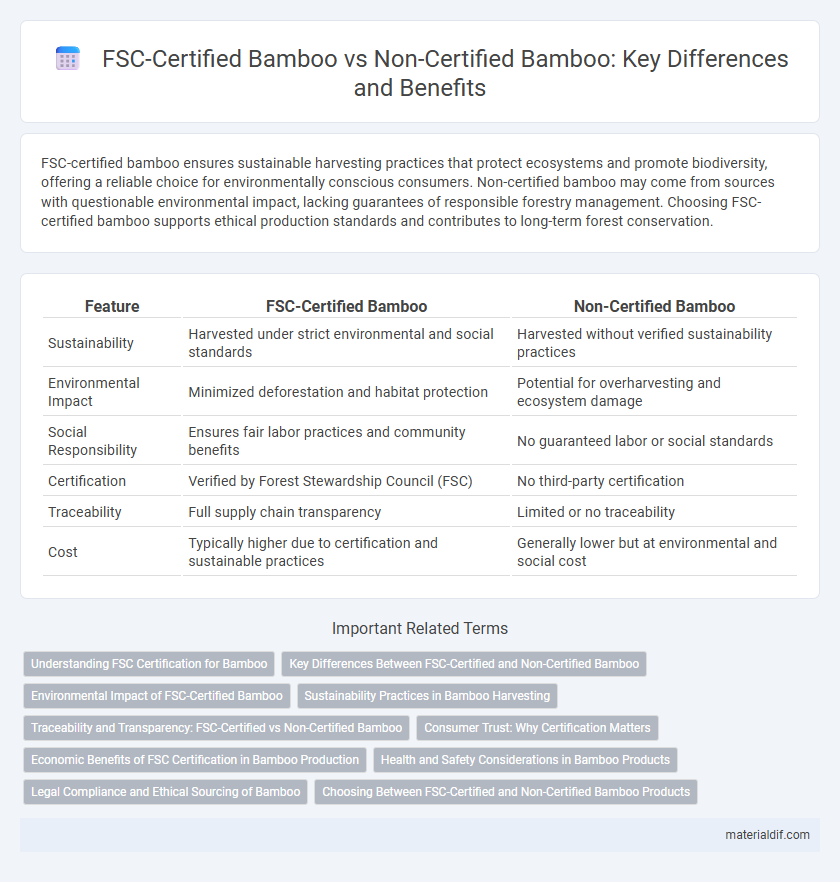FSC-certified bamboo ensures sustainable harvesting practices that protect ecosystems and promote biodiversity, offering a reliable choice for environmentally conscious consumers. Non-certified bamboo may come from sources with questionable environmental impact, lacking guarantees of responsible forestry management. Choosing FSC-certified bamboo supports ethical production standards and contributes to long-term forest conservation.
Table of Comparison
| Feature | FSC-Certified Bamboo | Non-Certified Bamboo |
|---|---|---|
| Sustainability | Harvested under strict environmental and social standards | Harvested without verified sustainability practices |
| Environmental Impact | Minimized deforestation and habitat protection | Potential for overharvesting and ecosystem damage |
| Social Responsibility | Ensures fair labor practices and community benefits | No guaranteed labor or social standards |
| Certification | Verified by Forest Stewardship Council (FSC) | No third-party certification |
| Traceability | Full supply chain transparency | Limited or no traceability |
| Cost | Typically higher due to certification and sustainable practices | Generally lower but at environmental and social cost |
Understanding FSC Certification for Bamboo
FSC certification for bamboo ensures that the material is sourced from responsibly managed forests that meet strict environmental, social, and economic standards set by the Forest Stewardship Council. This certification guarantees sustainable harvesting practices, protection of biodiversity, and respect for the rights of local communities compared to non-certified bamboo, which may contribute to deforestation and ecological harm. Choosing FSC-certified bamboo supports sustainable forestry practices and promotes long-term environmental stewardship in bamboo production.
Key Differences Between FSC-Certified and Non-Certified Bamboo
FSC-certified bamboo is harvested according to stringent environmental and social standards, ensuring sustainable forest management, biodiversity preservation, and fair labor practices, while non-certified bamboo lacks this verification, potentially leading to deforestation and unethical sourcing. The Forest Stewardship Council (FSC) certification guarantees traceability and accountability throughout the supply chain, promoting transparency that non-certified bamboo suppliers may not provide. Consumers and businesses seeking eco-friendly, responsibly sourced bamboo often prefer FSC-certified products to minimize environmental impact and support ethical production.
Environmental Impact of FSC-Certified Bamboo
FSC-certified bamboo ensures sustainable harvesting practices that minimize deforestation and preserve biodiversity, reducing the environmental footprint compared to non-certified bamboo. It promotes responsible forest management by safeguarding soil quality, preventing habitat destruction, and supporting carbon sequestration efforts. This certification guarantees transparency and accountability, encouraging eco-friendly production and reducing the overall ecological impact of bamboo products.
Sustainability Practices in Bamboo Harvesting
FSC-certified bamboo ensures sustainable harvesting practices by adhering to strict environmental standards that protect biodiversity and promote forest regeneration, reducing ecological impact compared to non-certified bamboo. Certification requires controlled cutting cycles and minimal soil disturbance, fostering long-term ecosystem health. Non-certified bamboo harvesting often lacks these regulations, potentially leading to overharvesting, habitat degradation, and loss of native species.
Traceability and Transparency: FSC-Certified vs Non-Certified Bamboo
FSC-certified bamboo offers superior traceability and transparency compared to non-certified bamboo, ensuring that every stage of the supply chain meets strict environmental and social standards verified by third-party audits. Non-certified bamboo often lacks documented sourcing information, increasing risks of illegal harvesting and unsustainable practices. The FSC certification guarantees responsible forest management and promotes consumer confidence by providing verifiable proof of sustainable bamboo cultivation and harvesting.
Consumer Trust: Why Certification Matters
FSC-certified bamboo ensures sustainable harvesting practices and environmental responsibility, which significantly boosts consumer trust compared to non-certified bamboo that lacks transparency. Certification provides verifiable assurance that the bamboo products come from responsibly managed forests, meeting stringent ecological and social standards. This trust influences purchasing decisions, as consumers increasingly prioritize eco-friendly and ethically sourced materials.
Economic Benefits of FSC Certification in Bamboo Production
FSC-certified bamboo commands higher market prices due to its verified sustainability, attracting eco-conscious consumers and premium buyers. This certification enhances access to international markets, increasing export opportunities and fostering long-term business growth for producers. Additionally, FSC certification reduces financial risks by promoting responsible forest management, ensuring the continuous supply of high-quality bamboo resources.
Health and Safety Considerations in Bamboo Products
FSC-certified bamboo ensures that the material is sourced from responsibly managed forests, reducing exposure to harmful chemicals often used in non-certified bamboo processing. Health and safety considerations highlight that certified bamboo products typically undergo rigorous testing for toxins, allergens, and contaminants, promoting safer indoor air quality. Non-certified bamboo may carry risks of chemical residues, such as formaldehyde or pesticides, posing potential health hazards to consumers.
Legal Compliance and Ethical Sourcing of Bamboo
FSC-certified bamboo guarantees legal compliance by adhering to strict regulations that prevent illegal logging and promote sustainable forest management. Ethical sourcing ensures the protection of local communities' rights, fair labor practices, and biodiversity conservation in bamboo harvesting areas. Non-certified bamboo often lacks transparency in origin and supply chain integrity, increasing the risk of environmental harm and social exploitation.
Choosing Between FSC-Certified and Non-Certified Bamboo Products
FSC-certified bamboo products ensure sustainable harvesting practices, traceability, and environmental stewardship, reducing deforestation and supporting biodiversity. Non-certified bamboo may come from sources with unclear supply chains, potentially contributing to habitat destruction and poor labor conditions. Choosing FSC-certified bamboo prioritizes eco-friendly production and supports responsible forestry management.
FSC-certified bamboo vs non-certified bamboo Infographic

 materialdif.com
materialdif.com